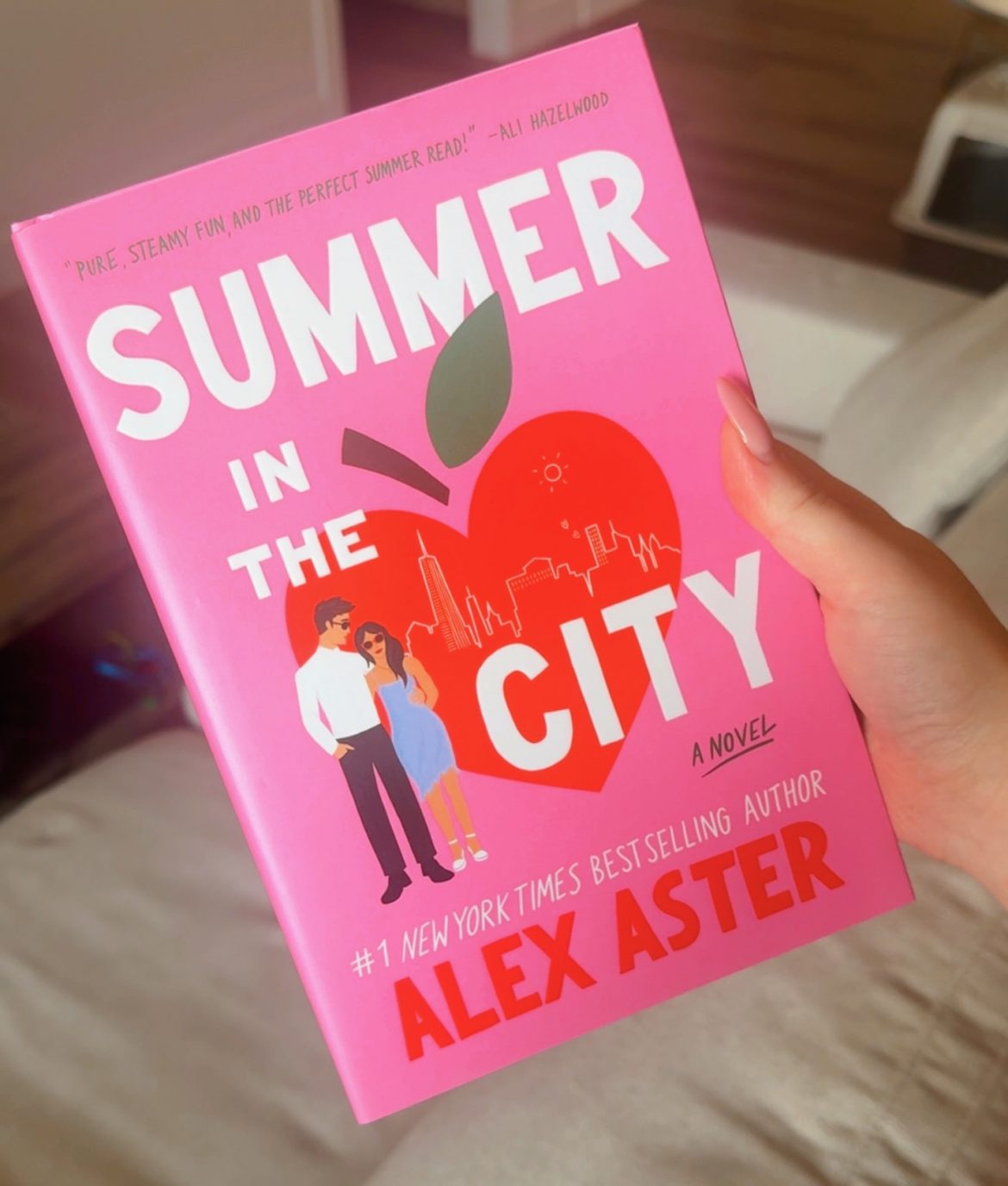Alex Aster, best known for her viral YA fantasy novels, takes a sharp left turn into adult romantic fiction with Summer in the City—and the result is surprisingly charming. Swapping magical kingdoms for the chaotic magic of Manhattan, Aster delivers a sun-soaked, enemies-to-lovers romance that is equal parts satire, self-discovery, and swoony indulgence. While the book doesn’t always get the balance quite right, there’s an undeniable allure to its high-rise heart and low-key longing.
Summary
Elle, a 27-year-old screenwriter with a stalled career and a serious case of writer’s block, lands a major opportunity to write a big-budget romance set in New York City. There’s just one catch: she has to finish it by summer’s end, and she hasn’t written a word in months.
Desperate for inspiration, Elle moves back to the city she once fled—into her globe-trotting sister’s luxury apartment, complete with floor-to-ceiling windows and skyline views. It seems like the perfect place to write… until she discovers her next-door neighbour is Parker Warren, a tech billionaire—and her stairwell hookup from two years ago. A hookup that ended so poorly she still bristles at the memory.
When a late-night argument leads to a writing breakthrough, Elle begrudgingly realises Parker might be the key to unlocking her creativity. He needs a fake girlfriend for the summer. She needs access to city landmarks for her script. One summer. One wall apart. One complicated history.
And a deal that—predictably, wonderfully—becomes more than pretend.
The review
An addictive premise with real rom-com sparkle
At its core, Summer in the City leans into classic romantic comedy tropes: enemies-to-lovers, forced proximity, and a fake relationship with a ticking clock. And it does them well. The story feels like it was designed for Netflix adaptation—snappy, scenic, and just messy enough to keep things interesting.
The premise is fast-paced and frothy, with a subtle emotional undercurrent that adds weight without dragging the story down. Elle’s journey as a blocked writer searching for inspiration—both creatively and emotionally—feels grounded even amidst the over-the-top glamour of billionaire penthouses and rooftop meet-cutes.
Aster nails New York as a character
If you’ve ever fallen in love with a city, you’ll understand why so many readers were swept up by Aster’s portrayal of New York. It buzzes, glows, and aches in the background of every scene. Whether Elle’s people-watching in Washington Square Park, chasing story ideas on the subway, or dancing under the skyline at night, the city becomes a character in its own right—simultaneously offering freedom, nostalgia, and pressure.
This setting isn’t just wallpaper. It reflects Elle’s transformation as she slowly lets go of old grief, starts to see herself outside of her pain, and begins to imagine a future with someone she once despised.
Parker Warren: billionaire boyfriend goals?
Let’s be honest—billionaire romances are everywhere, but Parker Warren doesn’t fit the usual mould. He’s not brooding or emotionally unavailable. In fact, Elle is the grumpy one here. Parker is endlessly patient, wildly devoted, and just unhinged enough to buy entire coffee chains for the girl he likes. He’s clearly designed to make readers swoon, and for the most part, it works.
If Elle is emotional chaos wrapped in a writer’s hoodie, Parker is the eye of the storm: steady, sincere, and just idealistic enough to believe their fake romance could turn real. The chemistry between them simmers, even if it sometimes slips into melodrama.
Elle: brilliant mess or unbearable lead?
Here’s where readers will be divided. Elle is not universally loved. Some see her as a realistic portrayal of grief, anxiety, and creative burnout. Others find her abrasive, bitter, and exhausting. She lashes out at Parker’s wealth, rejects help on principle, and clings to her mother’s idealism like a shield—often to the detriment of her own happiness.
But beneath the eye-rolls and sharp edges is a woman genuinely trying to figure out how to live without guilt. Her struggle with identity—especially in the shadow of a complicated family legacy—is moving, even if her choices frustrate. Aster doesn’t ask us to like Elle all the time, but she does ask us to understand her.
Where it stumbles
The book isn’t without flaws. Some readers found the ending a little too tidy, with a late-stage twist that felt manufactured rather than earned. Others wanted more from Elle’s career arc or more nuanced emotional development between the leads.
The writing itself is zippy and digestible but occasionally lacks depth. Descriptions can feel vague, and certain scenes move too quickly to resonate fully. Still, the narrative voice is undeniably addictive—you’ll likely fly through the chapters even when the dialogue turns slightly cheesy.
To sum up…
Summer in the City is a buzzy, modern rom-com that delivers exactly what it promises: romance, humour, and a wistful celebration of New York in all its complicated glory. Elle might not be your favourite protagonist, but her journey is relatable for anyone who’s ever felt stuck in their twenties and wondered if they missed the exit to a better life.
It’s not perfect. But it’s clever, heartfelt, and filled with small joys—much like the city it adores.
Rating: 3.5/5 (rounded up for Parker and the skyline scenes)
Recommended for fans of: Emily Henry’s Book Lovers or Tessa Bailey’s Fix Her Up.
ALSO SEE:
Featured Image: Instagram | chirpbooks

